HLSC122: Critical Evaluation of Evidence: Smart Drugs and Academics
VerifiedAdded on 2020/04/21
|11
|2478
|170
Report
AI Summary
This report presents a critical evaluation of two research studies examining the effects of psycho-stimulants, often referred to as "smart drugs," on academic performance and cognitive function among university students. The first study, a qualitative approach, explores the experiences of students using methylphenidate and amphetamines, both illicitly and with prescriptions, and their perceptions of academic enhancement. The second study investigates the relationship between non-medical use of prescription stimulants, executive functioning, and academic outcomes. The report analyzes the methodologies, strengths, and weaknesses of each study, and highlights the barriers to implementing evidence-based practices in this context. The evaluation concludes that neither study provides conclusive evidence of a positive impact of stimulants on cognitive function or academic performance, while also acknowledging the potential for side effects and the need for further research. The report also discusses the studies' alignment with the PICO format and offers insights into the use of evidence-based practices.
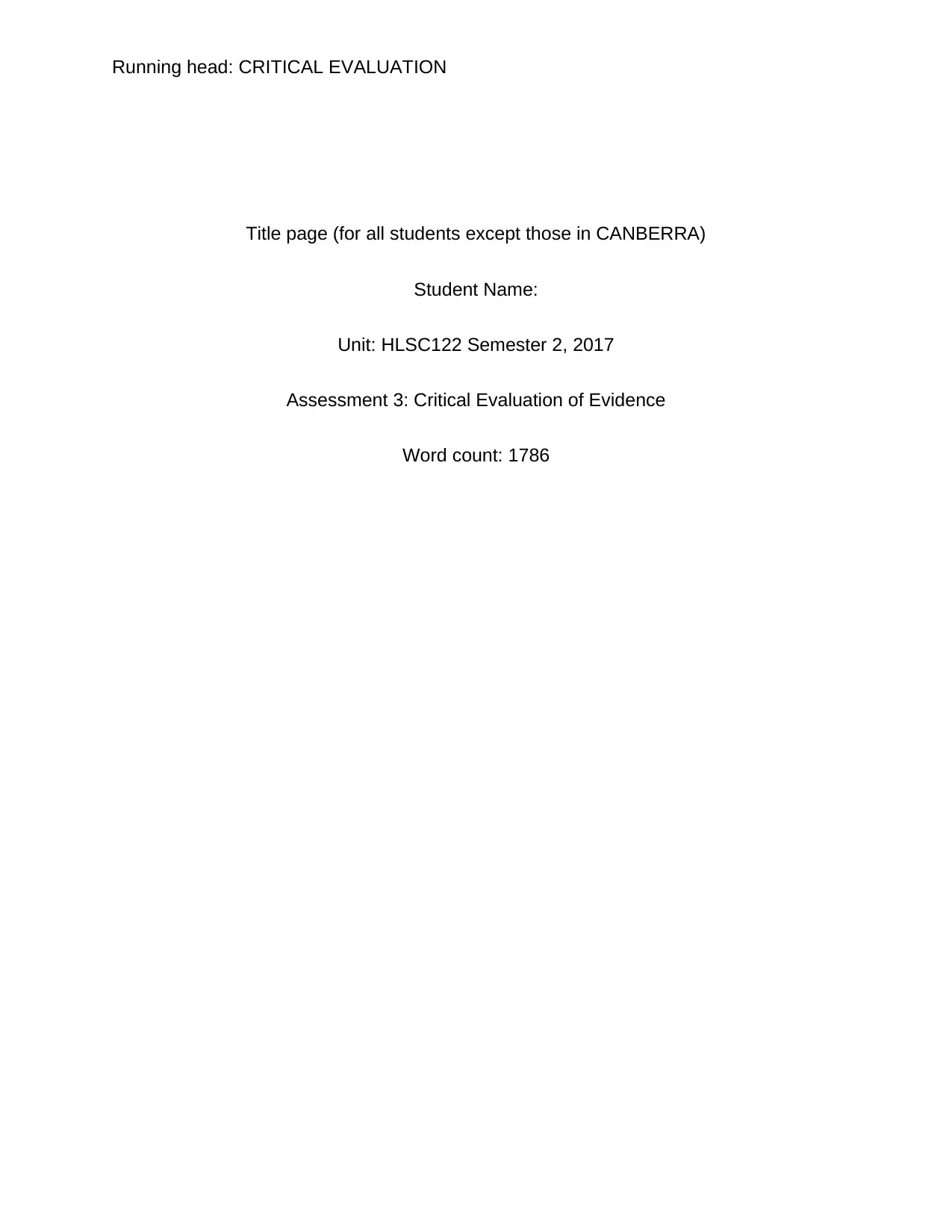
Running head: CRITICAL EVALUATION
Title page (for all students except those in CANBERRA)
Student Name:
Unit: HLSC122 Semester 2, 2017
Assessment 3: Critical Evaluation of Evidence
Word count: 1786
Title page (for all students except those in CANBERRA)
Student Name:
Unit: HLSC122 Semester 2, 2017
Assessment 3: Critical Evaluation of Evidence
Word count: 1786
Paraphrase This Document
Need a fresh take? Get an instant paraphrase of this document with our AI Paraphraser
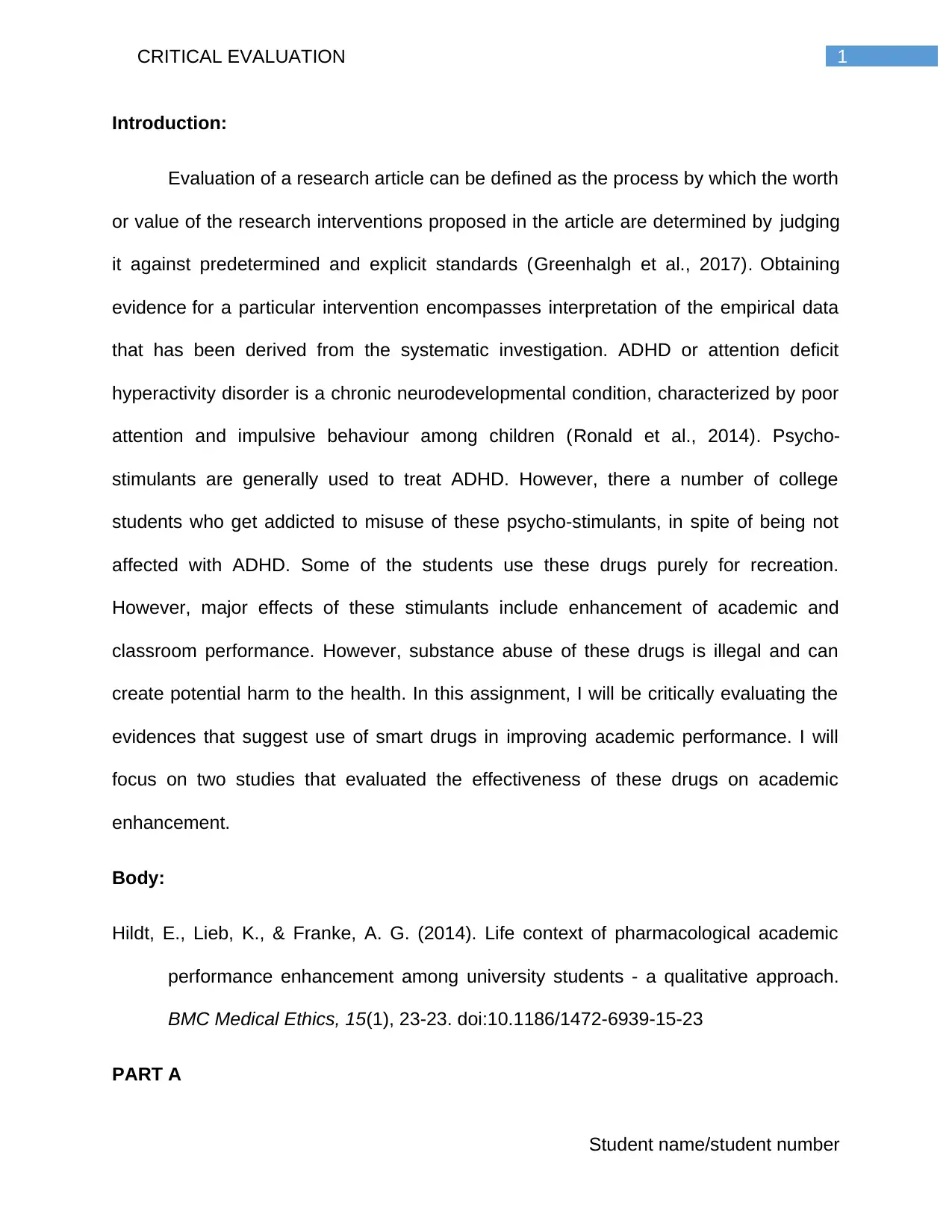
1CRITICAL EVALUATION
Introduction:
Evaluation of a research article can be defined as the process by which the worth
or value of the research interventions proposed in the article are determined by judging
it against predetermined and explicit standards (Greenhalgh et al., 2017). Obtaining
evidence for a particular intervention encompasses interpretation of the empirical data
that has been derived from the systematic investigation. ADHD or attention deficit
hyperactivity disorder is a chronic neurodevelopmental condition, characterized by poor
attention and impulsive behaviour among children (Ronald et al., 2014). Psycho-
stimulants are generally used to treat ADHD. However, there a number of college
students who get addicted to misuse of these psycho-stimulants, in spite of being not
affected with ADHD. Some of the students use these drugs purely for recreation.
However, major effects of these stimulants include enhancement of academic and
classroom performance. However, substance abuse of these drugs is illegal and can
create potential harm to the health. In this assignment, I will be critically evaluating the
evidences that suggest use of smart drugs in improving academic performance. I will
focus on two studies that evaluated the effectiveness of these drugs on academic
enhancement.
Body:
Hildt, E., Lieb, K., & Franke, A. G. (2014). Life context of pharmacological academic
performance enhancement among university students - a qualitative approach.
BMC Medical Ethics, 15(1), 23-23. doi:10.1186/1472-6939-15-23
PART A
Student name/student number
Introduction:
Evaluation of a research article can be defined as the process by which the worth
or value of the research interventions proposed in the article are determined by judging
it against predetermined and explicit standards (Greenhalgh et al., 2017). Obtaining
evidence for a particular intervention encompasses interpretation of the empirical data
that has been derived from the systematic investigation. ADHD or attention deficit
hyperactivity disorder is a chronic neurodevelopmental condition, characterized by poor
attention and impulsive behaviour among children (Ronald et al., 2014). Psycho-
stimulants are generally used to treat ADHD. However, there a number of college
students who get addicted to misuse of these psycho-stimulants, in spite of being not
affected with ADHD. Some of the students use these drugs purely for recreation.
However, major effects of these stimulants include enhancement of academic and
classroom performance. However, substance abuse of these drugs is illegal and can
create potential harm to the health. In this assignment, I will be critically evaluating the
evidences that suggest use of smart drugs in improving academic performance. I will
focus on two studies that evaluated the effectiveness of these drugs on academic
enhancement.
Body:
Hildt, E., Lieb, K., & Franke, A. G. (2014). Life context of pharmacological academic
performance enhancement among university students - a qualitative approach.
BMC Medical Ethics, 15(1), 23-23. doi:10.1186/1472-6939-15-23
PART A
Student name/student number
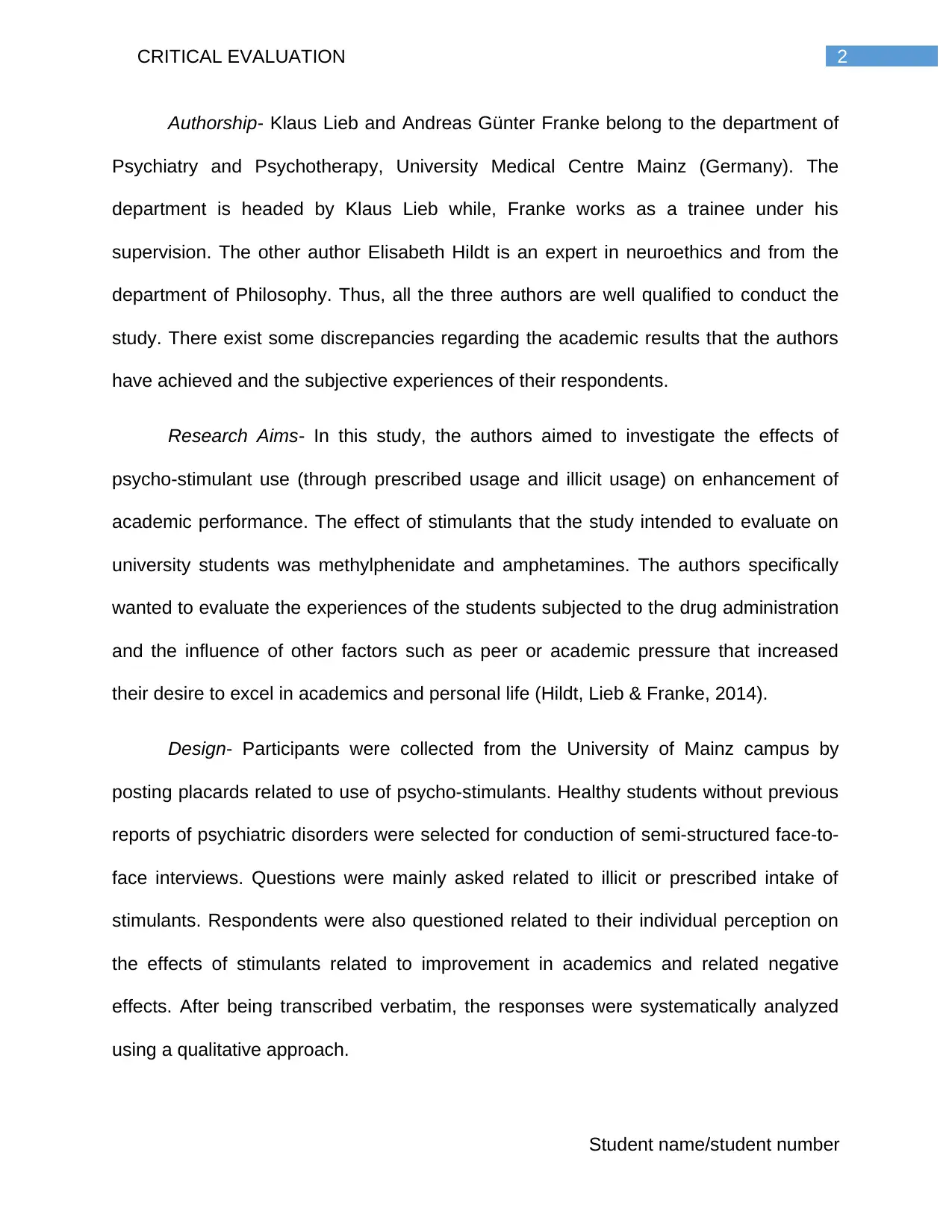
2CRITICAL EVALUATION
Authorship- Klaus Lieb and Andreas Günter Franke belong to the department of
Psychiatry and Psychotherapy, University Medical Centre Mainz (Germany). The
department is headed by Klaus Lieb while, Franke works as a trainee under his
supervision. The other author Elisabeth Hildt is an expert in neuroethics and from the
department of Philosophy. Thus, all the three authors are well qualified to conduct the
study. There exist some discrepancies regarding the academic results that the authors
have achieved and the subjective experiences of their respondents.
Research Aims- In this study, the authors aimed to investigate the effects of
psycho-stimulant use (through prescribed usage and illicit usage) on enhancement of
academic performance. The effect of stimulants that the study intended to evaluate on
university students was methylphenidate and amphetamines. The authors specifically
wanted to evaluate the experiences of the students subjected to the drug administration
and the influence of other factors such as peer or academic pressure that increased
their desire to excel in academics and personal life (Hildt, Lieb & Franke, 2014).
Design- Participants were collected from the University of Mainz campus by
posting placards related to use of psycho-stimulants. Healthy students without previous
reports of psychiatric disorders were selected for conduction of semi-structured face-to-
face interviews. Questions were mainly asked related to illicit or prescribed intake of
stimulants. Respondents were also questioned related to their individual perception on
the effects of stimulants related to improvement in academics and related negative
effects. After being transcribed verbatim, the responses were systematically analyzed
using a qualitative approach.
Student name/student number
Authorship- Klaus Lieb and Andreas Günter Franke belong to the department of
Psychiatry and Psychotherapy, University Medical Centre Mainz (Germany). The
department is headed by Klaus Lieb while, Franke works as a trainee under his
supervision. The other author Elisabeth Hildt is an expert in neuroethics and from the
department of Philosophy. Thus, all the three authors are well qualified to conduct the
study. There exist some discrepancies regarding the academic results that the authors
have achieved and the subjective experiences of their respondents.
Research Aims- In this study, the authors aimed to investigate the effects of
psycho-stimulant use (through prescribed usage and illicit usage) on enhancement of
academic performance. The effect of stimulants that the study intended to evaluate on
university students was methylphenidate and amphetamines. The authors specifically
wanted to evaluate the experiences of the students subjected to the drug administration
and the influence of other factors such as peer or academic pressure that increased
their desire to excel in academics and personal life (Hildt, Lieb & Franke, 2014).
Design- Participants were collected from the University of Mainz campus by
posting placards related to use of psycho-stimulants. Healthy students without previous
reports of psychiatric disorders were selected for conduction of semi-structured face-to-
face interviews. Questions were mainly asked related to illicit or prescribed intake of
stimulants. Respondents were also questioned related to their individual perception on
the effects of stimulants related to improvement in academics and related negative
effects. After being transcribed verbatim, the responses were systematically analyzed
using a qualitative approach.
Student name/student number
⊘ This is a preview!⊘
Do you want full access?
Subscribe today to unlock all pages.

Trusted by 1+ million students worldwide
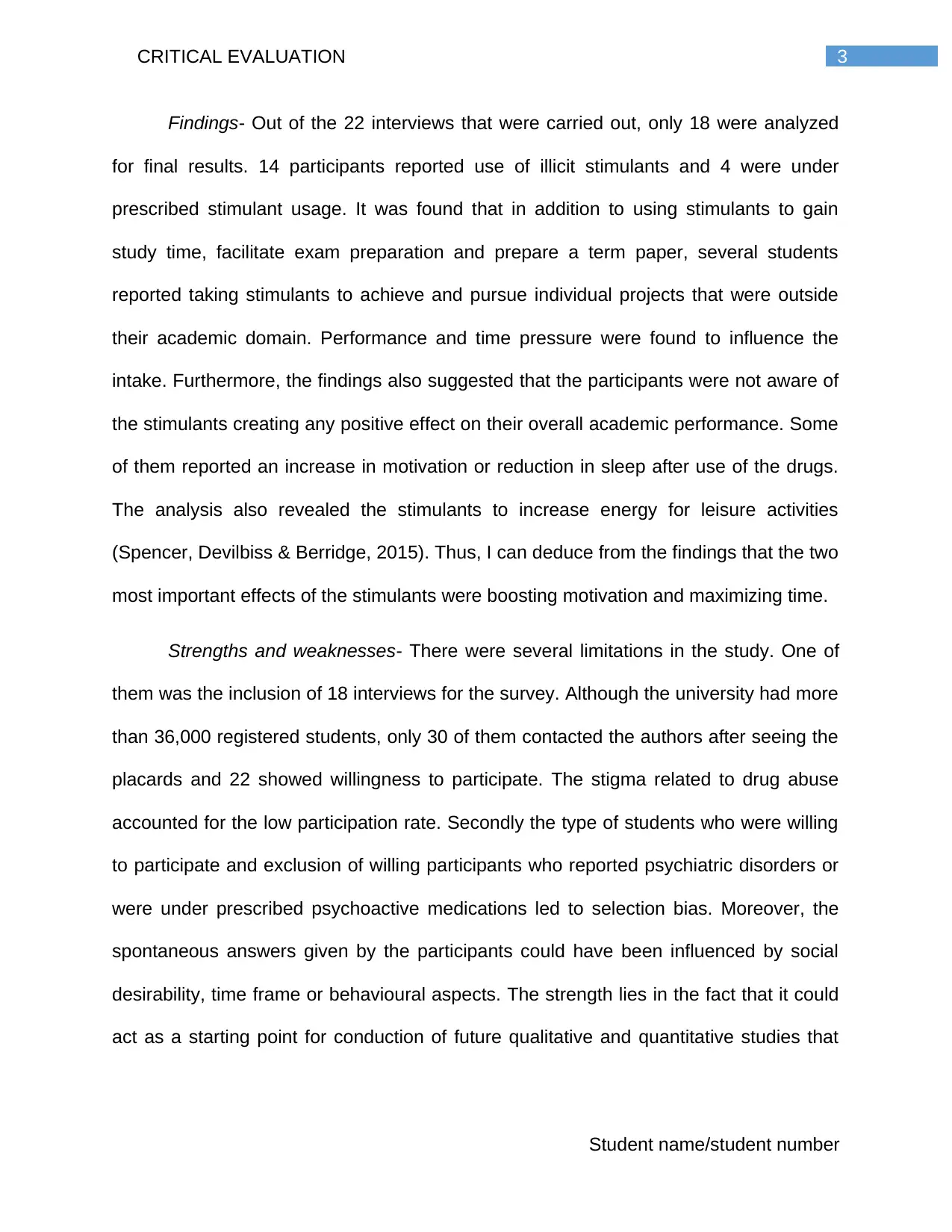
3CRITICAL EVALUATION
Findings- Out of the 22 interviews that were carried out, only 18 were analyzed
for final results. 14 participants reported use of illicit stimulants and 4 were under
prescribed stimulant usage. It was found that in addition to using stimulants to gain
study time, facilitate exam preparation and prepare a term paper, several students
reported taking stimulants to achieve and pursue individual projects that were outside
their academic domain. Performance and time pressure were found to influence the
intake. Furthermore, the findings also suggested that the participants were not aware of
the stimulants creating any positive effect on their overall academic performance. Some
of them reported an increase in motivation or reduction in sleep after use of the drugs.
The analysis also revealed the stimulants to increase energy for leisure activities
(Spencer, Devilbiss & Berridge, 2015). Thus, I can deduce from the findings that the two
most important effects of the stimulants were boosting motivation and maximizing time.
Strengths and weaknesses- There were several limitations in the study. One of
them was the inclusion of 18 interviews for the survey. Although the university had more
than 36,000 registered students, only 30 of them contacted the authors after seeing the
placards and 22 showed willingness to participate. The stigma related to drug abuse
accounted for the low participation rate. Secondly the type of students who were willing
to participate and exclusion of willing participants who reported psychiatric disorders or
were under prescribed psychoactive medications led to selection bias. Moreover, the
spontaneous answers given by the participants could have been influenced by social
desirability, time frame or behavioural aspects. The strength lies in the fact that it could
act as a starting point for conduction of future qualitative and quantitative studies that
Student name/student number
Findings- Out of the 22 interviews that were carried out, only 18 were analyzed
for final results. 14 participants reported use of illicit stimulants and 4 were under
prescribed stimulant usage. It was found that in addition to using stimulants to gain
study time, facilitate exam preparation and prepare a term paper, several students
reported taking stimulants to achieve and pursue individual projects that were outside
their academic domain. Performance and time pressure were found to influence the
intake. Furthermore, the findings also suggested that the participants were not aware of
the stimulants creating any positive effect on their overall academic performance. Some
of them reported an increase in motivation or reduction in sleep after use of the drugs.
The analysis also revealed the stimulants to increase energy for leisure activities
(Spencer, Devilbiss & Berridge, 2015). Thus, I can deduce from the findings that the two
most important effects of the stimulants were boosting motivation and maximizing time.
Strengths and weaknesses- There were several limitations in the study. One of
them was the inclusion of 18 interviews for the survey. Although the university had more
than 36,000 registered students, only 30 of them contacted the authors after seeing the
placards and 22 showed willingness to participate. The stigma related to drug abuse
accounted for the low participation rate. Secondly the type of students who were willing
to participate and exclusion of willing participants who reported psychiatric disorders or
were under prescribed psychoactive medications led to selection bias. Moreover, the
spontaneous answers given by the participants could have been influenced by social
desirability, time frame or behavioural aspects. The strength lies in the fact that it could
act as a starting point for conduction of future qualitative and quantitative studies that
Student name/student number
Paraphrase This Document
Need a fresh take? Get an instant paraphrase of this document with our AI Paraphraser
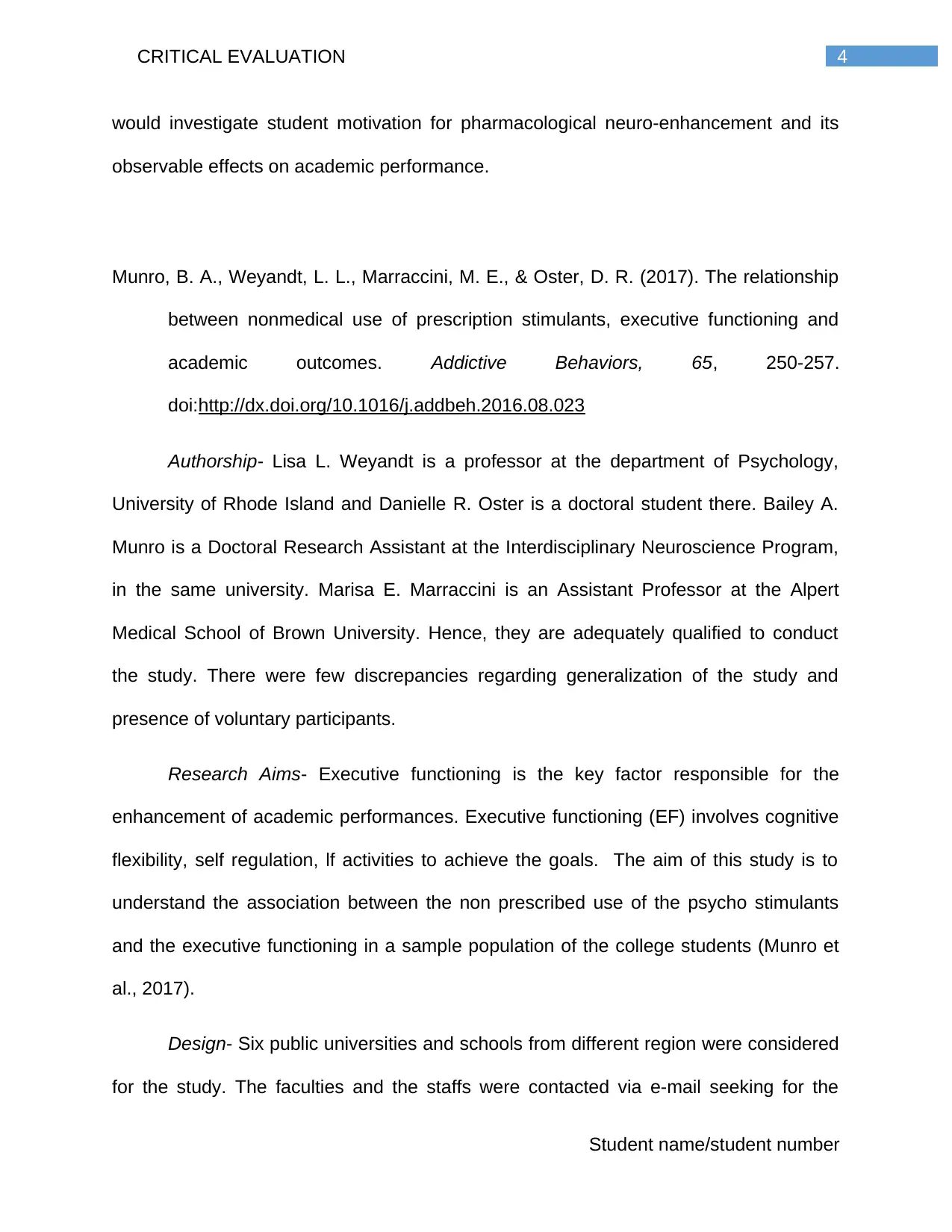
4CRITICAL EVALUATION
would investigate student motivation for pharmacological neuro-enhancement and its
observable effects on academic performance.
Munro, B. A., Weyandt, L. L., Marraccini, M. E., & Oster, D. R. (2017). The relationship
between nonmedical use of prescription stimulants, executive functioning and
academic outcomes. Addictive Behaviors, 65, 250-257.
doi:http://dx.doi.org/10.1016/j.addbeh.2016.08.023
Authorship- Lisa L. Weyandt is a professor at the department of Psychology,
University of Rhode Island and Danielle R. Oster is a doctoral student there. Bailey A.
Munro is a Doctoral Research Assistant at the Interdisciplinary Neuroscience Program,
in the same university. Marisa E. Marraccini is an Assistant Professor at the Alpert
Medical School of Brown University. Hence, they are adequately qualified to conduct
the study. There were few discrepancies regarding generalization of the study and
presence of voluntary participants.
Research Aims- Executive functioning is the key factor responsible for the
enhancement of academic performances. Executive functioning (EF) involves cognitive
flexibility, self regulation, lf activities to achieve the goals. The aim of this study is to
understand the association between the non prescribed use of the psycho stimulants
and the executive functioning in a sample population of the college students (Munro et
al., 2017).
Design- Six public universities and schools from different region were considered
for the study. The faculties and the staffs were contacted via e-mail seeking for the
Student name/student number
would investigate student motivation for pharmacological neuro-enhancement and its
observable effects on academic performance.
Munro, B. A., Weyandt, L. L., Marraccini, M. E., & Oster, D. R. (2017). The relationship
between nonmedical use of prescription stimulants, executive functioning and
academic outcomes. Addictive Behaviors, 65, 250-257.
doi:http://dx.doi.org/10.1016/j.addbeh.2016.08.023
Authorship- Lisa L. Weyandt is a professor at the department of Psychology,
University of Rhode Island and Danielle R. Oster is a doctoral student there. Bailey A.
Munro is a Doctoral Research Assistant at the Interdisciplinary Neuroscience Program,
in the same university. Marisa E. Marraccini is an Assistant Professor at the Alpert
Medical School of Brown University. Hence, they are adequately qualified to conduct
the study. There were few discrepancies regarding generalization of the study and
presence of voluntary participants.
Research Aims- Executive functioning is the key factor responsible for the
enhancement of academic performances. Executive functioning (EF) involves cognitive
flexibility, self regulation, lf activities to achieve the goals. The aim of this study is to
understand the association between the non prescribed use of the psycho stimulants
and the executive functioning in a sample population of the college students (Munro et
al., 2017).
Design- Six public universities and schools from different region were considered
for the study. The faculties and the staffs were contacted via e-mail seeking for the
Student name/student number
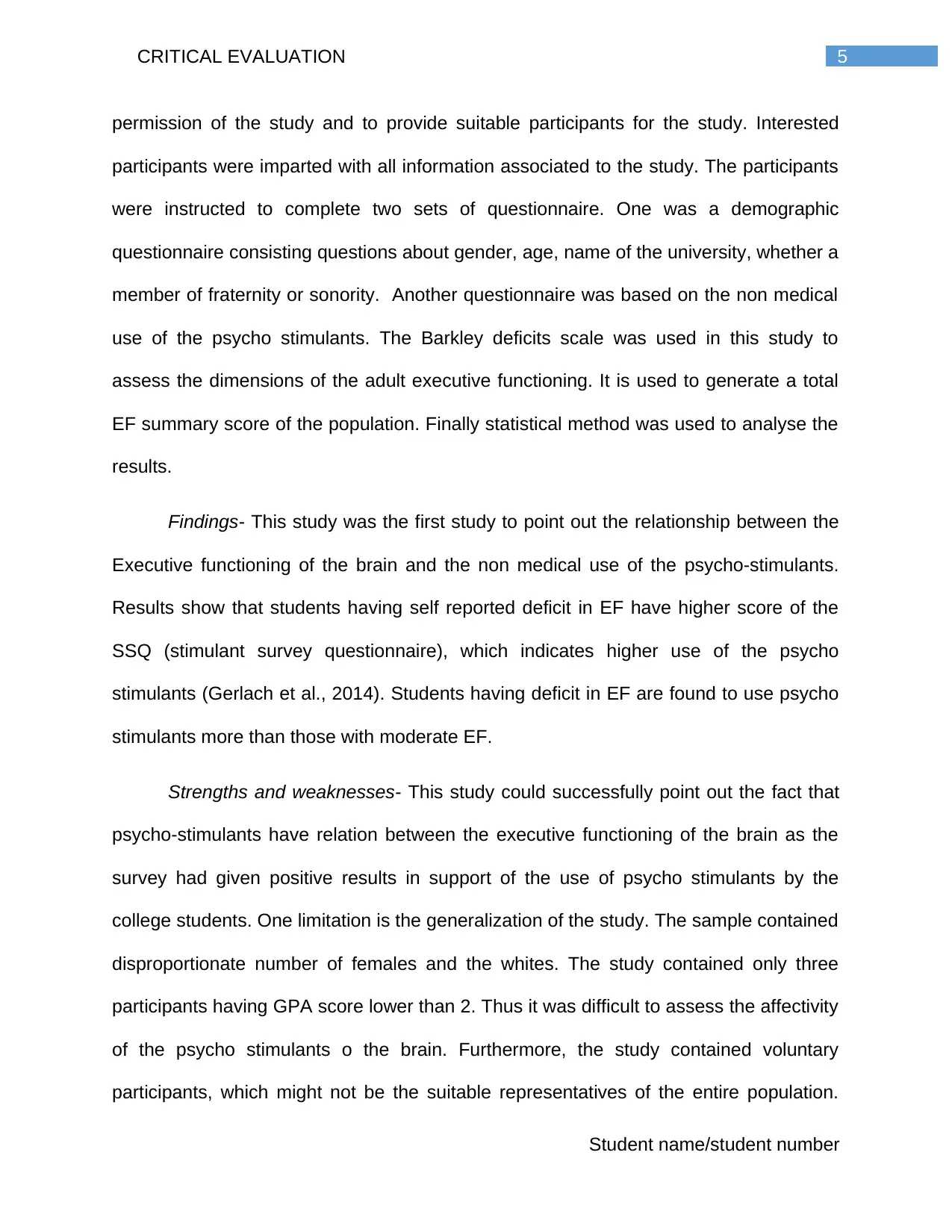
5CRITICAL EVALUATION
permission of the study and to provide suitable participants for the study. Interested
participants were imparted with all information associated to the study. The participants
were instructed to complete two sets of questionnaire. One was a demographic
questionnaire consisting questions about gender, age, name of the university, whether a
member of fraternity or sonority. Another questionnaire was based on the non medical
use of the psycho stimulants. The Barkley deficits scale was used in this study to
assess the dimensions of the adult executive functioning. It is used to generate a total
EF summary score of the population. Finally statistical method was used to analyse the
results.
Findings- This study was the first study to point out the relationship between the
Executive functioning of the brain and the non medical use of the psycho-stimulants.
Results show that students having self reported deficit in EF have higher score of the
SSQ (stimulant survey questionnaire), which indicates higher use of the psycho
stimulants (Gerlach et al., 2014). Students having deficit in EF are found to use psycho
stimulants more than those with moderate EF.
Strengths and weaknesses- This study could successfully point out the fact that
psycho-stimulants have relation between the executive functioning of the brain as the
survey had given positive results in support of the use of psycho stimulants by the
college students. One limitation is the generalization of the study. The sample contained
disproportionate number of females and the whites. The study contained only three
participants having GPA score lower than 2. Thus it was difficult to assess the affectivity
of the psycho stimulants o the brain. Furthermore, the study contained voluntary
participants, which might not be the suitable representatives of the entire population.
Student name/student number
permission of the study and to provide suitable participants for the study. Interested
participants were imparted with all information associated to the study. The participants
were instructed to complete two sets of questionnaire. One was a demographic
questionnaire consisting questions about gender, age, name of the university, whether a
member of fraternity or sonority. Another questionnaire was based on the non medical
use of the psycho stimulants. The Barkley deficits scale was used in this study to
assess the dimensions of the adult executive functioning. It is used to generate a total
EF summary score of the population. Finally statistical method was used to analyse the
results.
Findings- This study was the first study to point out the relationship between the
Executive functioning of the brain and the non medical use of the psycho-stimulants.
Results show that students having self reported deficit in EF have higher score of the
SSQ (stimulant survey questionnaire), which indicates higher use of the psycho
stimulants (Gerlach et al., 2014). Students having deficit in EF are found to use psycho
stimulants more than those with moderate EF.
Strengths and weaknesses- This study could successfully point out the fact that
psycho-stimulants have relation between the executive functioning of the brain as the
survey had given positive results in support of the use of psycho stimulants by the
college students. One limitation is the generalization of the study. The sample contained
disproportionate number of females and the whites. The study contained only three
participants having GPA score lower than 2. Thus it was difficult to assess the affectivity
of the psycho stimulants o the brain. Furthermore, the study contained voluntary
participants, which might not be the suitable representatives of the entire population.
Student name/student number
⊘ This is a preview!⊘
Do you want full access?
Subscribe today to unlock all pages.

Trusted by 1+ million students worldwide
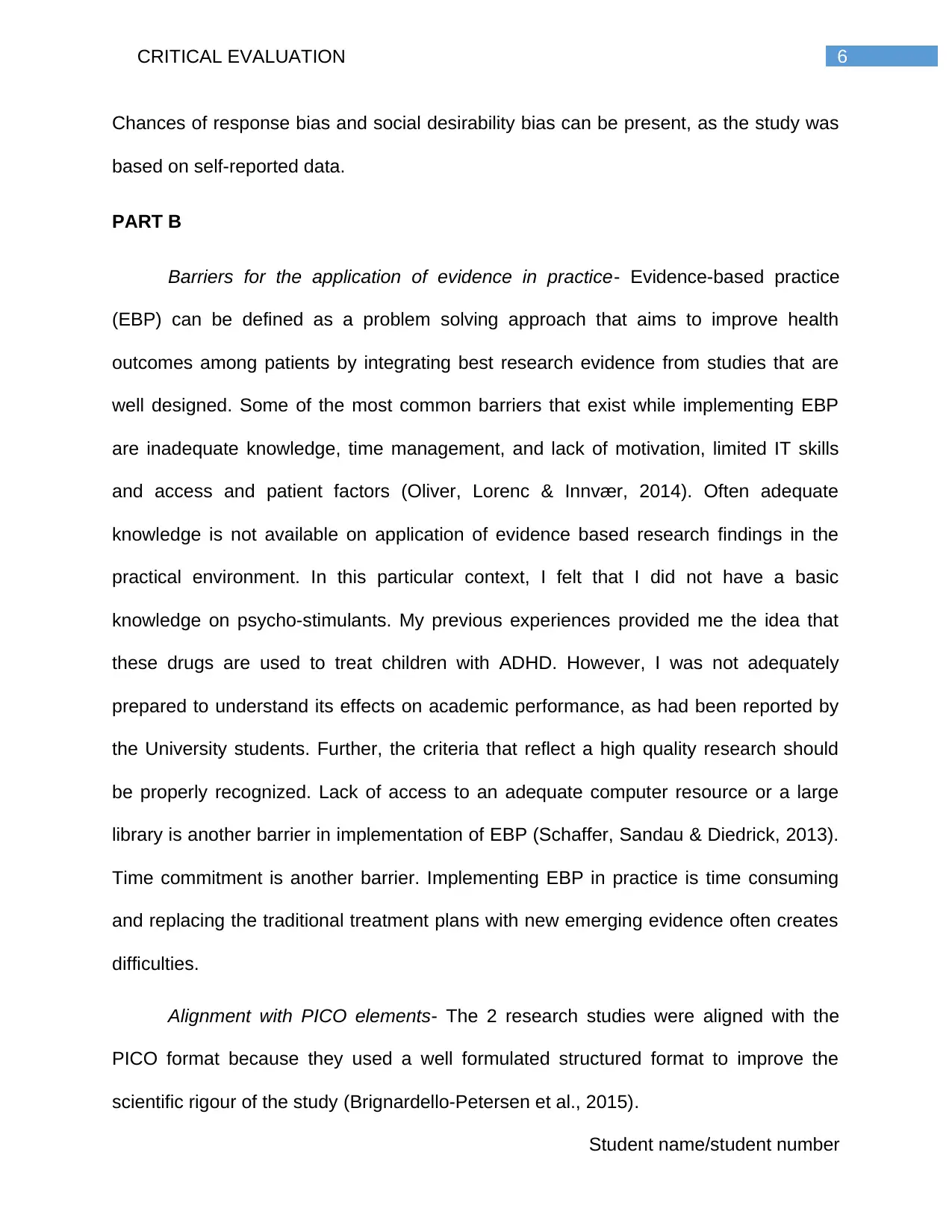
6CRITICAL EVALUATION
Chances of response bias and social desirability bias can be present, as the study was
based on self-reported data.
PART B
Barriers for the application of evidence in practice- Evidence-based practice
(EBP) can be defined as a problem solving approach that aims to improve health
outcomes among patients by integrating best research evidence from studies that are
well designed. Some of the most common barriers that exist while implementing EBP
are inadequate knowledge, time management, and lack of motivation, limited IT skills
and access and patient factors (Oliver, Lorenc & Innvær, 2014). Often adequate
knowledge is not available on application of evidence based research findings in the
practical environment. In this particular context, I felt that I did not have a basic
knowledge on psycho-stimulants. My previous experiences provided me the idea that
these drugs are used to treat children with ADHD. However, I was not adequately
prepared to understand its effects on academic performance, as had been reported by
the University students. Further, the criteria that reflect a high quality research should
be properly recognized. Lack of access to an adequate computer resource or a large
library is another barrier in implementation of EBP (Schaffer, Sandau & Diedrick, 2013).
Time commitment is another barrier. Implementing EBP in practice is time consuming
and replacing the traditional treatment plans with new emerging evidence often creates
difficulties.
Alignment with PICO elements- The 2 research studies were aligned with the
PICO format because they used a well formulated structured format to improve the
scientific rigour of the study (Brignardello-Petersen et al., 2015).
Student name/student number
Chances of response bias and social desirability bias can be present, as the study was
based on self-reported data.
PART B
Barriers for the application of evidence in practice- Evidence-based practice
(EBP) can be defined as a problem solving approach that aims to improve health
outcomes among patients by integrating best research evidence from studies that are
well designed. Some of the most common barriers that exist while implementing EBP
are inadequate knowledge, time management, and lack of motivation, limited IT skills
and access and patient factors (Oliver, Lorenc & Innvær, 2014). Often adequate
knowledge is not available on application of evidence based research findings in the
practical environment. In this particular context, I felt that I did not have a basic
knowledge on psycho-stimulants. My previous experiences provided me the idea that
these drugs are used to treat children with ADHD. However, I was not adequately
prepared to understand its effects on academic performance, as had been reported by
the University students. Further, the criteria that reflect a high quality research should
be properly recognized. Lack of access to an adequate computer resource or a large
library is another barrier in implementation of EBP (Schaffer, Sandau & Diedrick, 2013).
Time commitment is another barrier. Implementing EBP in practice is time consuming
and replacing the traditional treatment plans with new emerging evidence often creates
difficulties.
Alignment with PICO elements- The 2 research studies were aligned with the
PICO format because they used a well formulated structured format to improve the
scientific rigour of the study (Brignardello-Petersen et al., 2015).
Student name/student number
Paraphrase This Document
Need a fresh take? Get an instant paraphrase of this document with our AI Paraphraser
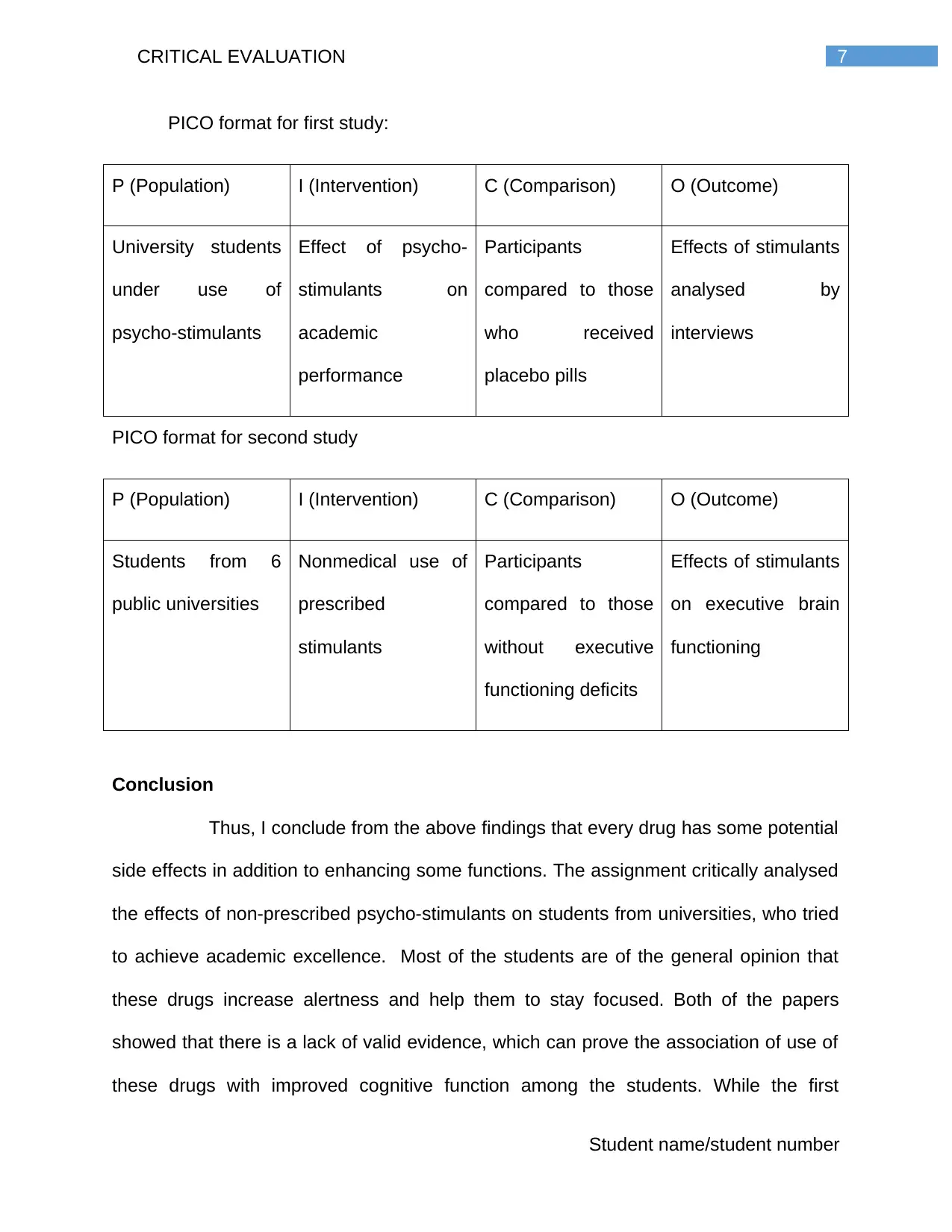
7CRITICAL EVALUATION
PICO format for first study:
P (Population) I (Intervention) C (Comparison) O (Outcome)
University students
under use of
psycho-stimulants
Effect of psycho-
stimulants on
academic
performance
Participants
compared to those
who received
placebo pills
Effects of stimulants
analysed by
interviews
PICO format for second study
P (Population) I (Intervention) C (Comparison) O (Outcome)
Students from 6
public universities
Nonmedical use of
prescribed
stimulants
Participants
compared to those
without executive
functioning deficits
Effects of stimulants
on executive brain
functioning
Conclusion
Thus, I conclude from the above findings that every drug has some potential
side effects in addition to enhancing some functions. The assignment critically analysed
the effects of non-prescribed psycho-stimulants on students from universities, who tried
to achieve academic excellence. Most of the students are of the general opinion that
these drugs increase alertness and help them to stay focused. Both of the papers
showed that there is a lack of valid evidence, which can prove the association of use of
these drugs with improved cognitive function among the students. While the first
Student name/student number
PICO format for first study:
P (Population) I (Intervention) C (Comparison) O (Outcome)
University students
under use of
psycho-stimulants
Effect of psycho-
stimulants on
academic
performance
Participants
compared to those
who received
placebo pills
Effects of stimulants
analysed by
interviews
PICO format for second study
P (Population) I (Intervention) C (Comparison) O (Outcome)
Students from 6
public universities
Nonmedical use of
prescribed
stimulants
Participants
compared to those
without executive
functioning deficits
Effects of stimulants
on executive brain
functioning
Conclusion
Thus, I conclude from the above findings that every drug has some potential
side effects in addition to enhancing some functions. The assignment critically analysed
the effects of non-prescribed psycho-stimulants on students from universities, who tried
to achieve academic excellence. Most of the students are of the general opinion that
these drugs increase alertness and help them to stay focused. Both of the papers
showed that there is a lack of valid evidence, which can prove the association of use of
these drugs with improved cognitive function among the students. While the first
Student name/student number
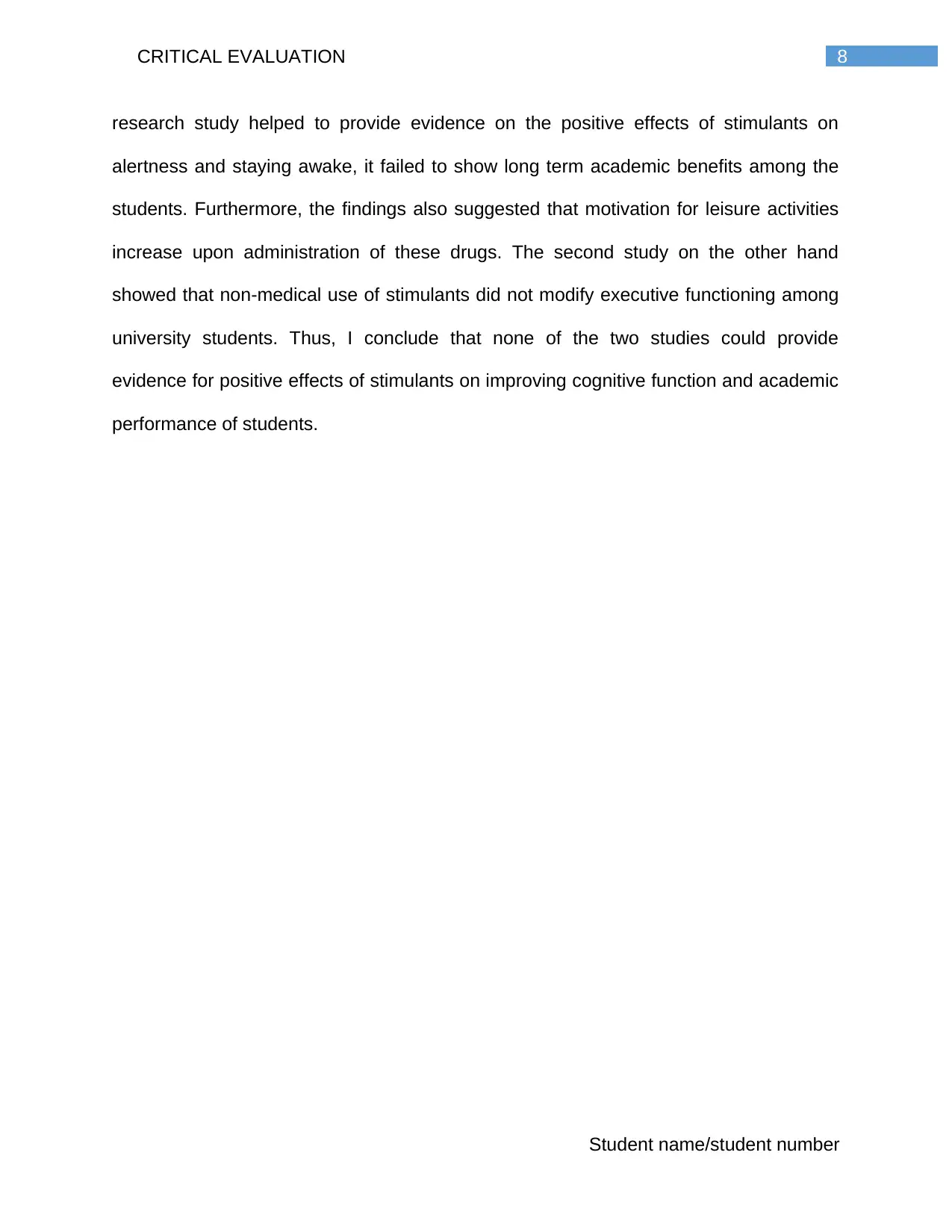
8CRITICAL EVALUATION
research study helped to provide evidence on the positive effects of stimulants on
alertness and staying awake, it failed to show long term academic benefits among the
students. Furthermore, the findings also suggested that motivation for leisure activities
increase upon administration of these drugs. The second study on the other hand
showed that non-medical use of stimulants did not modify executive functioning among
university students. Thus, I conclude that none of the two studies could provide
evidence for positive effects of stimulants on improving cognitive function and academic
performance of students.
Student name/student number
research study helped to provide evidence on the positive effects of stimulants on
alertness and staying awake, it failed to show long term academic benefits among the
students. Furthermore, the findings also suggested that motivation for leisure activities
increase upon administration of these drugs. The second study on the other hand
showed that non-medical use of stimulants did not modify executive functioning among
university students. Thus, I conclude that none of the two studies could provide
evidence for positive effects of stimulants on improving cognitive function and academic
performance of students.
Student name/student number
⊘ This is a preview!⊘
Do you want full access?
Subscribe today to unlock all pages.

Trusted by 1+ million students worldwide
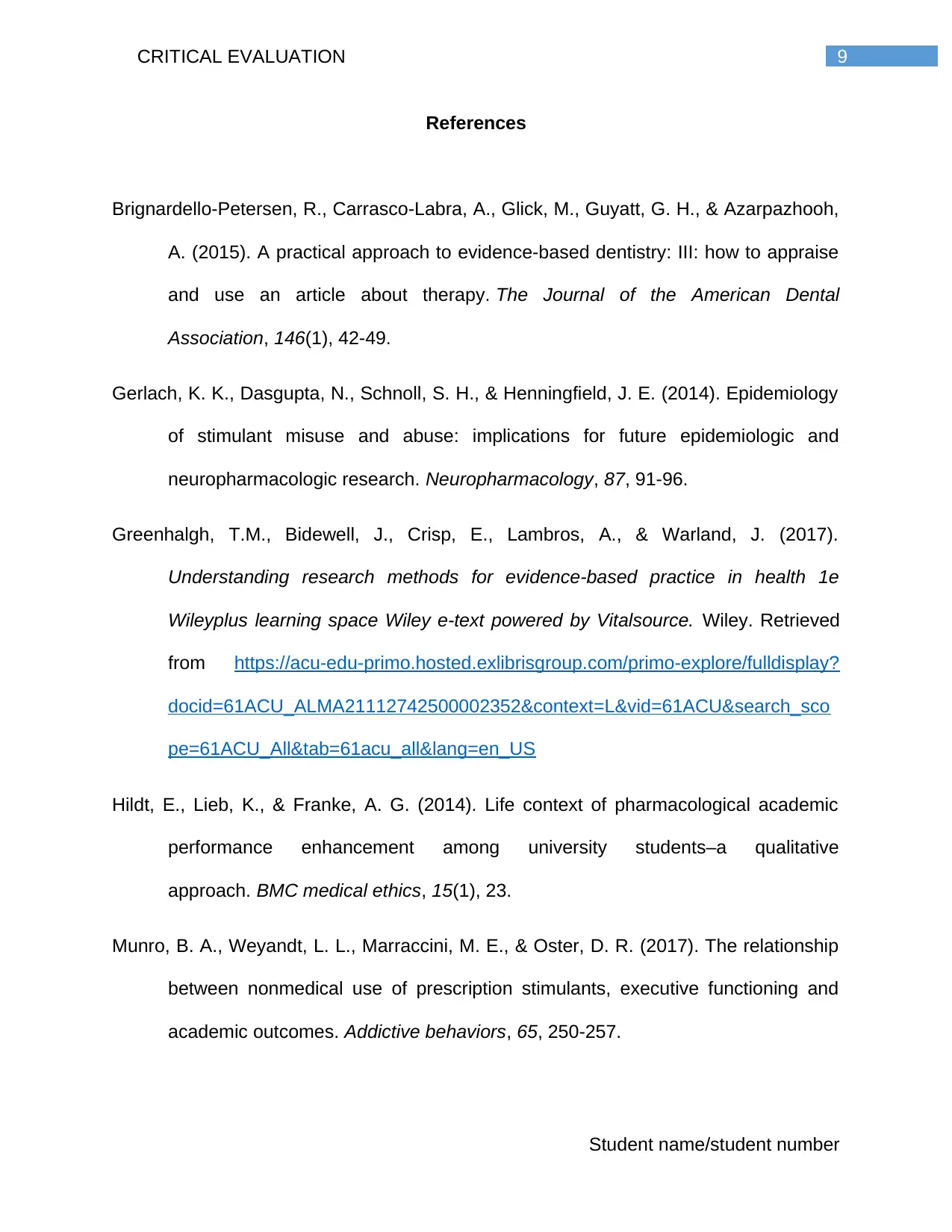
9CRITICAL EVALUATION
References
Brignardello-Petersen, R., Carrasco-Labra, A., Glick, M., Guyatt, G. H., & Azarpazhooh,
A. (2015). A practical approach to evidence-based dentistry: III: how to appraise
and use an article about therapy. The Journal of the American Dental
Association, 146(1), 42-49.
Gerlach, K. K., Dasgupta, N., Schnoll, S. H., & Henningfield, J. E. (2014). Epidemiology
of stimulant misuse and abuse: implications for future epidemiologic and
neuropharmacologic research. Neuropharmacology, 87, 91-96.
Greenhalgh, T.M., Bidewell, J., Crisp, E., Lambros, A., & Warland, J. (2017).
Understanding research methods for evidence-based practice in health 1e
Wileyplus learning space Wiley e-text powered by Vitalsource. Wiley. Retrieved
from https://acu-edu-primo.hosted.exlibrisgroup.com/primo-explore/fulldisplay?
docid=61ACU_ALMA21112742500002352&context=L&vid=61ACU&search_sco
pe=61ACU_All&tab=61acu_all&lang=en_US
Hildt, E., Lieb, K., & Franke, A. G. (2014). Life context of pharmacological academic
performance enhancement among university students–a qualitative
approach. BMC medical ethics, 15(1), 23.
Munro, B. A., Weyandt, L. L., Marraccini, M. E., & Oster, D. R. (2017). The relationship
between nonmedical use of prescription stimulants, executive functioning and
academic outcomes. Addictive behaviors, 65, 250-257.
Student name/student number
References
Brignardello-Petersen, R., Carrasco-Labra, A., Glick, M., Guyatt, G. H., & Azarpazhooh,
A. (2015). A practical approach to evidence-based dentistry: III: how to appraise
and use an article about therapy. The Journal of the American Dental
Association, 146(1), 42-49.
Gerlach, K. K., Dasgupta, N., Schnoll, S. H., & Henningfield, J. E. (2014). Epidemiology
of stimulant misuse and abuse: implications for future epidemiologic and
neuropharmacologic research. Neuropharmacology, 87, 91-96.
Greenhalgh, T.M., Bidewell, J., Crisp, E., Lambros, A., & Warland, J. (2017).
Understanding research methods for evidence-based practice in health 1e
Wileyplus learning space Wiley e-text powered by Vitalsource. Wiley. Retrieved
from https://acu-edu-primo.hosted.exlibrisgroup.com/primo-explore/fulldisplay?
docid=61ACU_ALMA21112742500002352&context=L&vid=61ACU&search_sco
pe=61ACU_All&tab=61acu_all&lang=en_US
Hildt, E., Lieb, K., & Franke, A. G. (2014). Life context of pharmacological academic
performance enhancement among university students–a qualitative
approach. BMC medical ethics, 15(1), 23.
Munro, B. A., Weyandt, L. L., Marraccini, M. E., & Oster, D. R. (2017). The relationship
between nonmedical use of prescription stimulants, executive functioning and
academic outcomes. Addictive behaviors, 65, 250-257.
Student name/student number
Paraphrase This Document
Need a fresh take? Get an instant paraphrase of this document with our AI Paraphraser
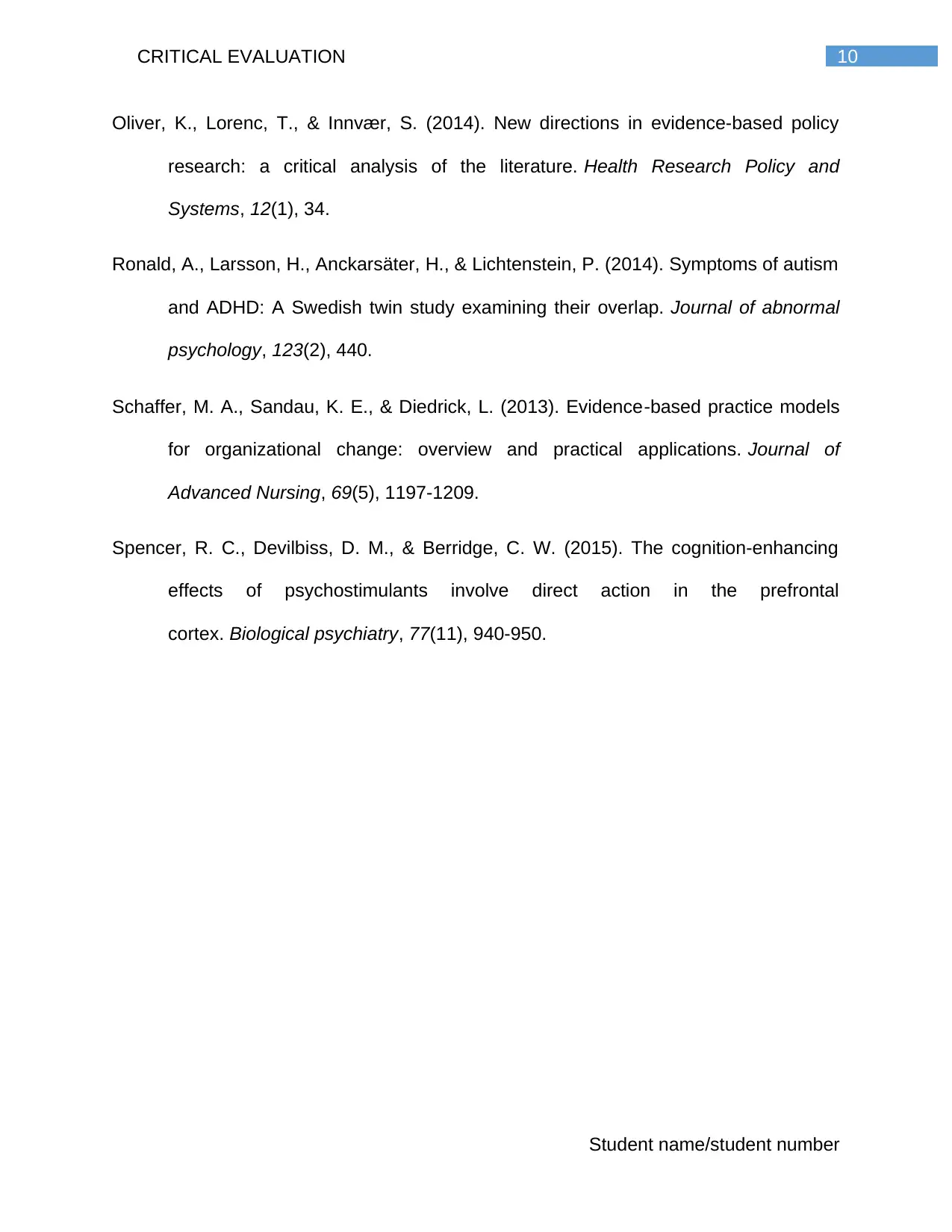
10CRITICAL EVALUATION
Oliver, K., Lorenc, T., & Innvær, S. (2014). New directions in evidence-based policy
research: a critical analysis of the literature. Health Research Policy and
Systems, 12(1), 34.
Ronald, A., Larsson, H., Anckarsäter, H., & Lichtenstein, P. (2014). Symptoms of autism
and ADHD: A Swedish twin study examining their overlap. Journal of abnormal
psychology, 123(2), 440.
Schaffer, M. A., Sandau, K. E., & Diedrick, L. (2013). Evidence‐based practice models
for organizational change: overview and practical applications. Journal of
Advanced Nursing, 69(5), 1197-1209.
Spencer, R. C., Devilbiss, D. M., & Berridge, C. W. (2015). The cognition-enhancing
effects of psychostimulants involve direct action in the prefrontal
cortex. Biological psychiatry, 77(11), 940-950.
Student name/student number
Oliver, K., Lorenc, T., & Innvær, S. (2014). New directions in evidence-based policy
research: a critical analysis of the literature. Health Research Policy and
Systems, 12(1), 34.
Ronald, A., Larsson, H., Anckarsäter, H., & Lichtenstein, P. (2014). Symptoms of autism
and ADHD: A Swedish twin study examining their overlap. Journal of abnormal
psychology, 123(2), 440.
Schaffer, M. A., Sandau, K. E., & Diedrick, L. (2013). Evidence‐based practice models
for organizational change: overview and practical applications. Journal of
Advanced Nursing, 69(5), 1197-1209.
Spencer, R. C., Devilbiss, D. M., & Berridge, C. W. (2015). The cognition-enhancing
effects of psychostimulants involve direct action in the prefrontal
cortex. Biological psychiatry, 77(11), 940-950.
Student name/student number
1 out of 11
Related Documents
Your All-in-One AI-Powered Toolkit for Academic Success.
+13062052269
info@desklib.com
Available 24*7 on WhatsApp / Email
![[object Object]](/_next/static/media/star-bottom.7253800d.svg)
Unlock your academic potential
Copyright © 2020–2026 A2Z Services. All Rights Reserved. Developed and managed by ZUCOL.





